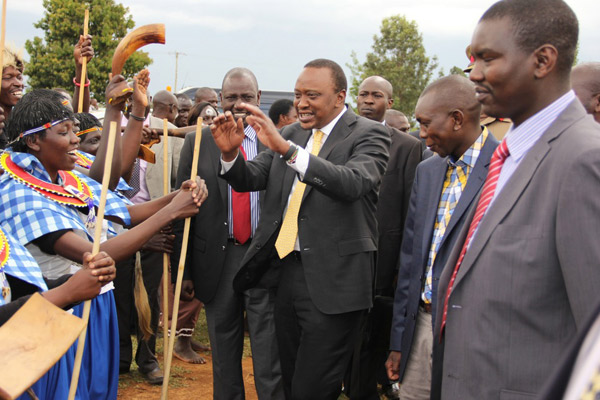Trust is critical to democracy. Citizens that trust each other not to exploit the system and more likely to pay tax and to follow the rules themselves. Leaders who trust each other are less likely to resort to violent strategies and more likely to accept the results of controversial political processes. As a result, the lack of trust at the heart of Kenyan politics is a major barrier to the consolidation of democracy.
Kenyans do not trust each other as much as Tanzanians. The World Values Survey, which asks citizens around the world about their activities, beliefs and opinions, has consistently found that Kenyans are less trusting than their counterparts on the other side of the border.
Indeed, compared to many societies in Africa, Kenyans are less likely to say that they trust people they don’t know, and less likely to say that they trust people they do know.
At the same time, domestic opinion polls regularly find that a majority of Kenyans lack trust in some of the county’s most important democratic institutions.
POLITICAL CONSEQUENCES
The political consequences of this lack of trust are profound. Consider the most basic challenge facing African countries today: development. The lack of trust between individuals and communities undermines the provision of essential government services.
The research of Edward Miguel, a political scientist at Stanford University, helps us to understand why. In an influential paper published in a leading journal, Miguel compared the impact of ethnic diversity on the provision of education in Kenya and Tanzania.
Miguel wanted to work out whether a relationship exists between how ethnically diverse an area is and how well it performs when it comes to development. More specifically, he wanted to investigate the widespread assumption that areas that are more ethnically diverse find it harder to provide public goods such as hospitals and schools.
This is an intuitively appealing assumption. Providing public goods through the community – for example, in the form of harambee schools that are set up by citizens rather than the government – requires everyone in a community to pull together to create a service that can be enjoyed by all. This is not always an easy thing to achieve.
Community members are often aware that they will gain from the provision of a hospital or school whether or not they contribute to it personally. This gives them an incentive to try and get a “free ride” by siting back and letting others do all the hard work, safe in the knowledge that they will still get to enjoy the benefits.
As a result, it is difficult to make sure that everyone contributes equally, even when everyone shares a common identity. Ensuring that everyone pulls their weight typically requires one of two things: a strong sense of solidarity within the community, or a way of punishing those people who do not contribute in order to force them to do their fair share.
HARD TO FOSTER SOLIDARITY
It is generally harder to foster a strong sense of solidarity when citizens come from different ethnic or religious groups that do not always see eye-to-eye. Given this, it seems likely that more ethnically diverse areas will suffer from higher levels of “free riding”.
In turn, this can be fatal to development because if enough community members sit back and do nothing, the school or hospital will never get built.
This is why many policy makers and researchers assume that ethnic diversity undermines development.
EMPIRICAL TEST
Miguel decided to empirically test whether this assumption was true by comparing the impact of ethnic diversity on development in Kenya and Tanzania.
In Kenya, he found that the expected relationship held. Communities in more ethnically diverse areas are less likely to build schools than communities in which one ethnic group predominates. Ethnic diversity acts as a barrier to development.
But Miguel also found that the relationship did not hold in Tanzania. In contrast to Kenya, there was no significant difference between the provision of education in more ethnically diverse areas and more homogenous ones.
This raises an interesting question: what explains the different impact of ethnicity in Kenya and Tanzania? The answer is trust.
Because individuals from different ethnic groups in Tanzania trust each other, the presence of different ethnic groups does not make it impossible to develop the strong sense of solidarity needed for everyone to want to contribute to the creation of a school or hospital.
By contrast, in Kenya the lack of trust between the members of different ethnic groups means that the more diverse an area is, the less likely it is to feature public goods provided by the community.
Miguel’s research focussed on the provision of education but it has wide ranging implications. The same logic is likely to apply when it comes to paying tax at the county and national level.
Kenyans are less likely to trust others to pay the taxes that they owe than Tanzanians, and so they are more likely to try and avoid paying tax themselves – unless they have to.
But it does not have to be this way. Kenyans have not always trusted each other less than Tanzanians. This situation has come about as a result of the very different political history of the two nations.
While Tanzanian President Julius Nyerere set about building a national identity that would supersede ethnic ties, Kenyan leaders have been more likely to play that kind of divide-and-rule politics that serves to entrench ethnic identities.
It is not impossible to turn back the clock. Nyerere fostered a sense of trust and solidarity by pursuing three key policies during his time in office. First, he promoted Swahili as a common language so that all Tanzanians would be able to communicate.
Second, he emphasised the importance of the nation and the public good over the interests of the individual and the ethnic group. Third, he backed up his words by providing services to all, not just to his own community.
Trust between Kenyans has fallen as a result of the post-election violence of 2007 and the election controversy of 2013, but President Uhuru Kenyatta still has a real opportunity to change the way that Kenyans think about each other.
EQUITABLE INVESTMENT IN KEY SECTORS
Equitable investment in health and education will help to move Kenya away from the winner-takes-all mentality. Ensuring that the cabinet is representative of a range of different communities can engender a greater sense of inclusion. Celebrating national heroes, whether they be literary or athletics stars, will promote a sense of common achievement.
But leadership and vision are also required. If he is to follow Nyerere and build a nation, President Kenyatta must do what no Kenyan president has done before: articulate a common Kenyan identity that all citizens can feel a part of.









No Comment